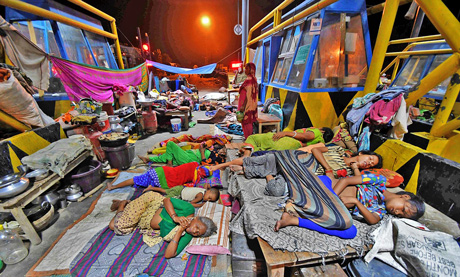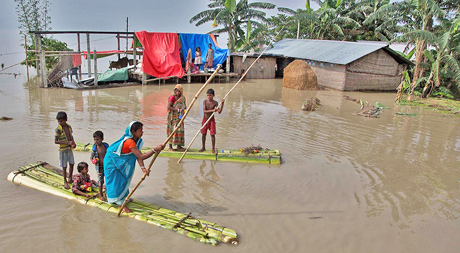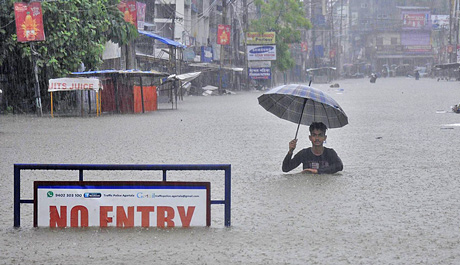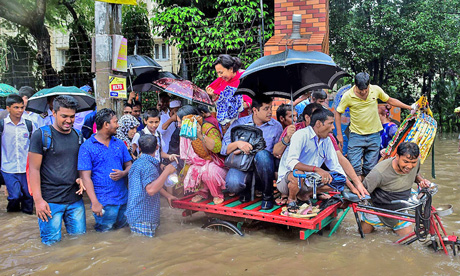
United Nations – While all eyes have been on the devastation from Hurricane Harvey in Texas, catastrophic floods have also been wreaking havoc more than 8,000 miles away in South Asia. About 16 million children across India, Bangladesh and Nepal are in urgent need of life-saving support due to “catastrophic” flooding in the three South Asian countries, a UN agency said.
“Millions of children have seen their lives swept away by these devastating floods” said Jean Gough, UNICEF Regional Director for South Asia. “Children have lost their homes, schools and even friends and loved ones. There is a danger the worst could still be to come as rains continue and flood waters move south” she added.
Weeks of torrential monsoon rains and catastrophic flooding in Nepal, India, and Bangladesh have devastated the lives of millions of children and families. UNICEF estimates that almost 16 million children and their families are in urgent need of life-saving support. Since mid-August, there have been at least 1,288 reported deaths.
Many areas remain inaccessible due to damage to roads, bridges, railways and airports. The most urgent needs for children are clean water, hygiene supplies to prevent the spread of disease, food supplies and safe places in evacuation centres for children to play, the UN agency said.
The United Nations Children’s Fund (UNICEF) is on the

“Massive damage to school infrastructure and supplies also mean hundreds of thousands of children may miss weeks or months of school” said Gough. “Getting children back into school is absolutely critical in establishing a sense of stability for children during times of crisis and provides a sense of normality when everything else is being turned upside down.”


In Bangladesh alone, more than eight million people have been affected by flooding, including around three million children. An estimated 696,169 houses have been damaged or destroyed and 2,292 primary and community schools have been damaged by high water. There have already been more than 13,035 cases of water-borne diseases in the country.
In Nepal, 1.7 million people, including 680,000 children, have been affected with 352,738 displaced from their homes. More than 185,126 homes have been damaged or destroyed in addition to 1,958 schools, affecting the education of 253,605 children.

Georgetown – Two passports belonging to a Colombian and a Brazilian were found onboard the illegal aircraft that was discovered at Santa Fe, Region Nine on August 13 last, according to Acting Commissioner of Police, David Ramnarine.
It is suspected that the travel documents belong to two of the three persons who were seen running away from an illegal airstrip in which the plane had landed. They ran away when police ranks visited the village after receiving reports of strange flights.
“Their IDs were also found there and they corresponded with what is in the passports,” the acting top cop noted. The twin-engine Beechcraft King Air plane has a similar registration number to an aircraft owned by a bank in neighbouring Brazil. An investigation is still ongoing to determine whether the registration number is authentic.
A Lethem businessman and a contractor who police believed are linked to the illegal plane and airstrip were recently released on bail. It is being reported that the businessman paid the contractor to prepare the airstrip.
This discovery was made just a week after soldiers found another illegal airstrip, a chain saw, aviation fuel, 12 abandoned camps and several dug out trenches in the same area.
Additionally, another illegal airstrip was found in Yurupukari, Region Nine in September 2015. Investigations later revealed that the plane had originated in Colombia. According to the US report, although the AML legislation gives the FIU authority to investigate alleged money laundering, the FIU does not have the capacity to conduct such investigations. The SOCU, on the other hand, only investigates those cases referred to it by the FIU.
However, the effectiveness of these agencies at investigating money laundering is limited, as they lack adequate human resources, training to ensure successful prosecutions, and a strong inter-agency network. Additionally, the lack of cooperation by the business community also hinders Guyana’s AML efforts.
Recently, the US agreed to support Guyana’s anti-money laundering regime by covering the cost of the initial training and support service required to implement software that would improve data collection and tracking of financial transactions.
In addition to methods of money laundering discussed in Part 2, the US report also identified other common money laundering methods including the use of fictitious agreements of sale for non-existing precious minerals to support large cash deposits at financial institutions; cross-border transport of small volumes of precious metals, declared as scrap or broken jewelry to avoid scrutiny by the relevant officials and the payment of relevant taxes and duties; Trade Based Money Laundering using gold, that is, the process by which criminals use gold to disguise their criminal proceeds; and the use of middle- and senior-aged cash couriers for the cross-border transport of large sums of U.S. dollars.
Invoice fixing is also another method of money laundering. Such allegations were apparently made against a large forestry company which has since run into trouble with the current government.
Arguably, it would seem as though both the US and the European Parliament are aware of incidences of money laundering which are not adequately dealt with by the government, causing the country to remain on their blacklists. They also recognize the existence of structural weaknesses in preventing money laundering and drug trafficking.
By being blacklisted, Guyana faces several counter-measures in the international community, among them, the requirement for enhanced due diligence measures; introducing enhanced reporting mechanisms or systematic reporting of financial transactions; refusing the establishment of subsidiaries or branches or representative offices of foreign banks in the country, and limiting the business relationships or financial transactions with Guyana or persons in Guyana.
In a local newspaper report following the earlier blacklisting by the CFATF, Governor of the Bank of Guyana, Dr. Gobind Ganga, is reported saying that blacklisting will not only result in a major cost to the Guyanese economy but also have adverse effects, including a slower financial process in terms of making payments, remittances, receipts from exporters; and decreased efficiency of financial engagement for businesses.
At that point in time, CARICOM expressed deep concern about the impact that any adverse action by CFATF Member States could have on the Guyanese economy and by extension the CARICOM Region as a whole, particularly in the areas of trade and financial services.
The regional body then stated that any action that reduces the ease or increases the cost of processing international financial or trade transactions will adversely affect trade and financial flows in the Region, retard the regional integration enterprise and reverse the gains made by Guyana and the region. CARICOM noted that this could also directly and severely hinder the functioning of the CARICOM Secretariat which is based in Guyana. The regional body was also mindful that blacklisting could result in hardship for the people of Guyana.
Paradoxically, the US has blacklisted 14 of 15 CARICOM members, including Antigua and Barbuda, Bahamas, Barbados, Belize, Dominica, Grenada, Guyana, Haiti, Jamaica, St. Kitts and Nevis, St. Lucia, St. Vincent and the Grenadines, Suriname and Trinidad & Tobago. The only CARICOM state that was not blacklisted is Montserrat, which is also a British Overseas Territory. Therefore Guyana finds itself in friendly company.
One of the other major consequences of blacklisting for Guyana and its CARICOM counterparts will be the unwillingness of international banks to act as correspondent banks for global transactions coming out of and entering the CARICOM countries.
In recent years, foreign correspondent banks have increasingly withheld their services to Guyana and other countries because of fear of financial penalties from the US if they are found doing business with suspected money laundering entities in the Caribbean.
As a result, the ability of these countries to conduct international transactions have been severely constrained, hurting businesses and even affecting individuals who depend on overseas remittances.
Commenting on being blacklisted by the US, Minister of Finance Winston Jordan is reported saying: “This now adds more to our misery. To lump all the countries which might be at various stages of the implementation of the money laundering legislation, to lump 14 countries which don’t appear on either FATF or CFATF list of countries in default, it is a sad blow to the Caribbean and it is a denial of recognition of the efforts made by all of these countries…to making our countries safer, to rid our countries of bad money,” he said.
He added that the region as a collective will now have to go back to the drawing board and come up with a plan of action to deal with the bold headlines.
His sentiments were echoed by Donville Inniss, Barbados Minister of Industry, International Business, Commerce and Small Business Development who called for a joint regional reaction against the classification.
“We are still 15 nations going into the international fora, grappling with an understanding of the issues and then perhaps 15 divergent positions on the matter, and I have been saying publicly and privately in regional meetings that we really need to come together,” Inniss is reported saying in the Barbados press.
He flatly blamed officials of the Guyana based CARICOM Secretariat and heads of government of the respective states for the lack of a united approach.
“It is like pulling teeth to get the folks in Georgetown, Guyana to understand the issues and I would go as far as to suggest that I do not think the leaders in the region appreciate the gravity of the situation,” he said.
Inniss’ call for coordinated CARICOM action was also echoed by Eastern Caribbean Central Bank Governor, Timothy Antoine, who pointed out that the world views the Caribbean as a brand or single entity. “It means that notwithstanding our heroic domestic efforts, larger countries, correspondent banks, regulators and even international institutions regard us as a homogeneous region. Consequently, the weaknesses of one often impact the reputation of all.”
Antoine added: “these international operators do not know and frankly spoken, often do not care, about our country-specific circumstances including our detailed implementation plans for certain reforms and standards.”
Incidentally, the current Chairman of CARICOM is Guyana’s President David Granger. Should he be leading the charge for Guyana and its CARICOM counterparts?


